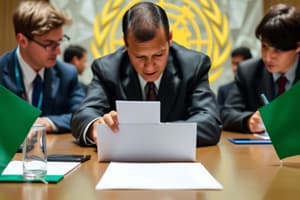Podcast
Questions and Answers
Which types of goals might non-profit NGOs focus on?
Which types of goals might non-profit NGOs focus on?
- Education, infrastructure, and advocacy (correct)
- Entertainment, fashion, and tourism
- Finance, sports, and beauty
- Transportation, agriculture, and technology
What is one of the funding sources for NGOs mentioned in the text?
What is one of the funding sources for NGOs mentioned in the text?
- Private donations and government loans (correct)
- Community fundraisers and venture capital
- Public taxes and subscription fees
- Corporate sponsorships and foreign investments
Which organizations has the World Bank identified as operational NGOs?
Which organizations has the World Bank identified as operational NGOs?
- Those dedicated to political participation
- Those that promote specific causes
- Those that focus on human rights advocacy
- Those involved in design and implementation of development projects (correct)
What role do Advocacy NGOs play according to the text?
What role do Advocacy NGOs play according to the text?
What might be an area of focus for NGOs that support minority rights?
What might be an area of focus for NGOs that support minority rights?
What distinguishes non-profit NGOs from for-profit organizations?
What distinguishes non-profit NGOs from for-profit organizations?
Which aspect of international development do NGOs majorly contribute to?
Which aspect of international development do NGOs majorly contribute to?
'Operational NGOs' are primarily involved in which of the following according to the text?
'Operational NGOs' are primarily involved in which of the following according to the text?
What is a common funding source for NGOs mentioned in the text?
What is a common funding source for NGOs mentioned in the text?
What distinguishes Advocacy NGOs from Operational NGOs?
What distinguishes Advocacy NGOs from Operational NGOs?
Flashcards are hidden until you start studying
Study Notes
Characteristics of International Organizations
- International organizations have States as members, but other entities can also apply for membership.
- They make and are governed by international law, but decision-making is often based on political judgement.
History of International Organizations
- Before 1850, only a few international organizations existed.
- In the early 21st century, several thousand international organizations were active.
Legal Personality of International Organizations
- An international organization (IO) constitutes a legal person, enabling it to: • Sign agreements with other entities • Own movable and immovable property • Bring legal actions and claims • Enjoy certain privileges, such as tax immunity
Functions of International Organizations
- IOs fulfill functions of cooperation and integration, with the goal of cooperation rather than integration.
- They adopt standards and ensure compliance.
Organizational Structure of International Organizations
- Most IOs have a secretariat, general assembly, diverse councils or commissions, and a tribunal.
Types of International Organizations
Intergovernmental Organizations (IGOs)
- Composed of nation-states, promoting voluntary cooperation and coordination among members.
- Decisions are not enforceable, and members remain independent.
- Examples: United Nations
Supranational Organizations
- Member states surrender power in specific areas to the higher organization.
- Decisions are binding on member states, with courts to determine violations.
- Examples: European Union, World Trade Organization
Non-Governmental Organizations (NGOs)
- Non-profit, private organizations operating outside government control.
- Focus on areas such as health, education, infrastructure, advocacy, and human rights.
- Examples: American Red Cross, World Bank
Funding and Activities of NGOs
- Rely on funding sources, including private donations, membership dues, and government grants.
- Operational NGOs focus on development projects, while Advocacy NGOs defend or promote specific causes.
Studying That Suits You
Use AI to generate personalized quizzes and flashcards to suit your learning preferences.




